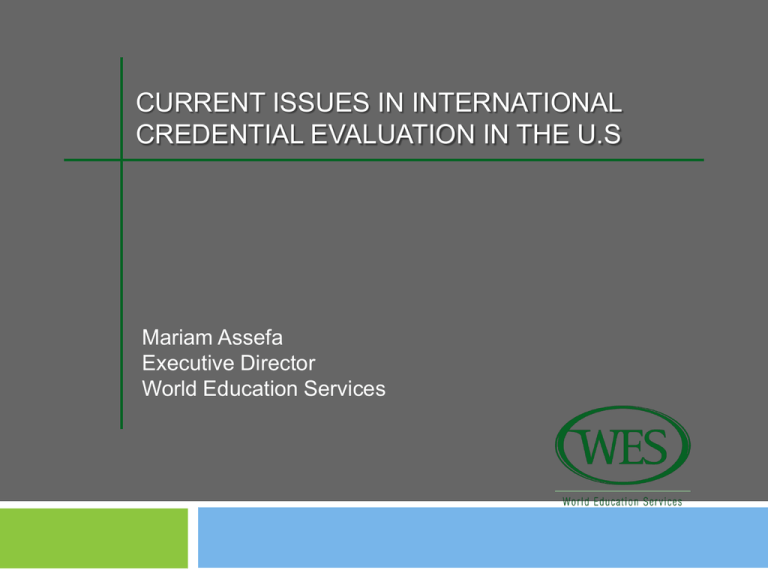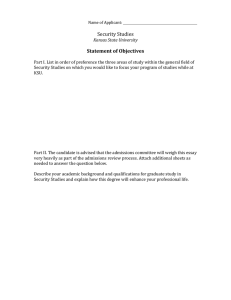
CURRENT ISSUES IN INTERNATIONAL
CREDENTIAL EVALUATION IN THE U.S
Mariam Assefa
Executive Director
World Education Services
Today’s Presentation
New Landscape
US Admissions Practices
Changing Role of Credential Evaluation
© 2011 World Education Services, Inc. All rights reserved.
2
Impact of Budget Cuts on Institutions
Budget cuts causing institutions to recruit large
numbers of international students to generate
revenue
Pressure to increase student numbers
quickly to meet revenue targets
Increased use of paid agents to recruit abroad
Traditional admissions practices and culture
under pressure
© 2011 World Education Services, Inc. All rights reserved.
3
New Institutions and Programs
New types of institutions:
off-shore programs
feeder institutions
transnational programs: joint and dual degrees
More complex institution and program
accreditation and recognition regimes
New and problematic documentation standards
and issues
© 2011 World Education Services, Inc. All rights reserved.
4
The Lisbon Recognition Convention
Joint Council of Europe/UNESCO Convention
on the Recognition of Qualifications in the
European Region (includes the US)
The Convention codified the notion that a
foreign credential should be recognized unless
a substantial difference can be shown
between the two
Essentially discarded the long-held notion that
two credentials had to be very similar for
recognition to be granted
© 2011 World Education Services, Inc. All rights reserved.
5
Impact of the Lisbon Recognition Convention
The Convention mandated that evaluators recognize
credentials unless they can demonstrate substantial
differences
Shifted recognition from relying solely on input to
focusing on outcomes of education
Laid the groundwork for the Bologna Process
Transformed role of credential evaluation from gate
keeping to facilitation of mobility and recognition
© 2011 World Education Services, Inc. All rights reserved.
6
Impact of the Bologna Process
Reformed European degree programs
Made European degrees transparent and portable
Guaranteed automatic intra-European recognition
Made European universities internationally visible and
competitive
Increased enrollment of non-Europeans in graduate
programs
Contributed to world-wide competition for international
students
© 2011 World Education Services, Inc. All rights reserved.
7
The New Students
Know that institutions world-wide desire them
They are ambitious and wealthy
Have access to the latest technology
Require information and clear instructions on
what is expected from them
Use agents to navigate the admissions process
They have become demanding customers
© 2011 World Education Services, Inc. All rights reserved.
8
US Admissions Practice
US admissions calendar requires that students
apply before completing the final year
Admissions is largely based on transcripts
showing performance in the classroom
Relies on standardized tests to gauge student
ability
Teacher recommendations and student essay
complete the picture
© 2011 World Education Services, Inc. All rights reserved.
9
The Challenge for US International Admissions
Most education systems place more emphasis
on final examinations or admit by entrance
examination
Transcripts -and grades- not as reliable
Standardized tests not always available
Teachers not used to writing letters of
recommendation
Transcripts delivered by agents are viewed
with suspicion
© 2011 World Education Services, Inc. All rights reserved.
10
Expert Evaluation Purpose
Mitigate risk
confirm the authenticity and validity of foreign
credentials
verify recognition of institutions in home country
Provide transparency
allow users to understand foreign educational
credentials
allow comparison with US-educated candidates
Provide opportunity
allow foreign-educated individuals gain access to jobs
and education at the appropriate levels
© 2011 World Education Services, Inc. All rights reserved.
11
Evaluation Service Users
Education Market
Individuals educated outside the US wishing to
study or work in the US
institutions that enroll international students or
recruit foreign faculty
Employment Market
employers that hire foreign-educated candidates
state boards of professional licensing that receive
applications from foreign-educated individuals
© 2011 World Education Services, Inc. All rights reserved.
12
New and Expanded Role of Evaluations
Facilitate mobility and recognition
Enable institutions to meet enrollment goals
Ensure standards and integrity of the
admissions process
Fight document fraud
Keep abreast of emerging trends
Participate in and inform institutional goal setting
© 2011 World Education Services, Inc. All rights reserved.
13
WES Evaluation Database
WES uses a custom-built electronic evaluation
system. It contains information on:
200 countries and jurisdictions
40,000+ institutions
20,000+ credentials
2,000+ grading scales
© 2011 World Education Services, Inc. All rights reserved.
14
WES 2011 Output
provided evaluations for 63,000 individuals
sent to 2000+ academic institutions in the US
and Canada
trained 1200 university personnel
distributed information to 6000 individuals
worldwide through WENR - monthly electronic
newsletter
© 2011 World Education Services, Inc. All rights reserved.
15
Thank you.
You can reach me at
massefa@wes.org
© 2011 World Education Services, Inc. All rights reserved.
16


